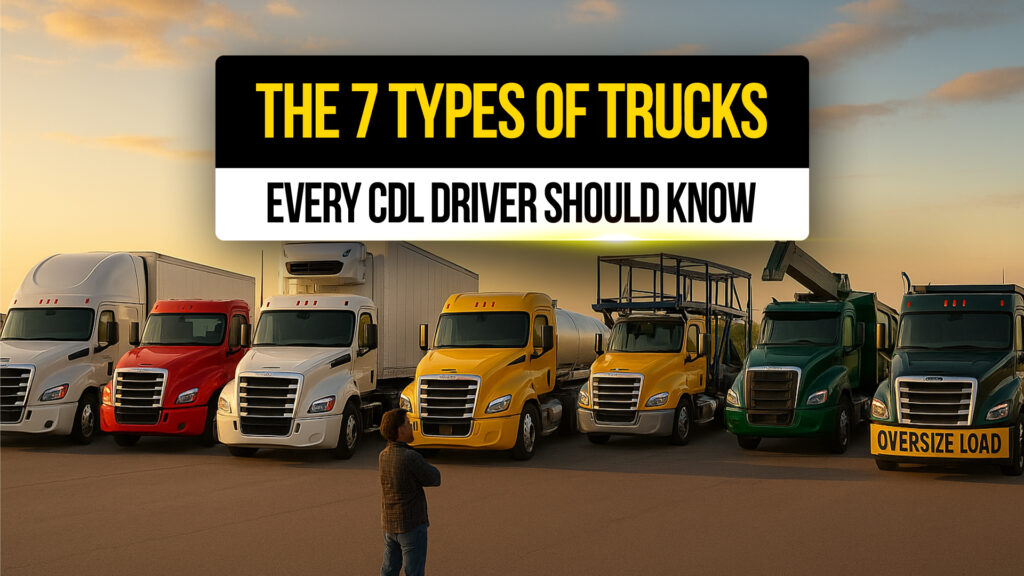
When you’re behind the wheel, it’s not just about getting from point A to point B, it’s about knowing what you’re driving and how it shapes your workday, your pay, and your lifestyle. Whether you’re brand new or have years on the road, understanding the main types of trucks can help you plan your next move wisely.
In this guide, we break down seven common trucks every CDL driver should know, and what they mean for your job options.
1. Dry Van Trucks
What they are:
Dry vans are the most common trucks you’ll see on the road, your typical 53-foot trailer hauling non-perishable goods.
What to know:
- Steady, predictable loads
- Often great for newer drivers
- Mostly no-touch freight
- Can run OTR or regional
2. Flatbed Trucks
What they are:
Flatbeds haul oversized or irregular freight, like steel beams or lumber, that won’t fit inside a standard trailer.
What to know:
- Usually higher pay for securement and tarping
- More physical work (strapping, chaining, tarping)
- Often daylight hours
3. Refrigerated (Reefer) Trucks
What they are:
Reefers transport temperature-sensitive loads like food, flowers, or pharmaceuticals.
What to know:
- Extra pay for monitoring temps
- Can involve night or early morning deliveries
- Good for drivers who like steady work all year
4. Tanker Trucks
What they are:
Tankers haul liquids or gases, like fuel, milk, or chemicals.
What to know:
- Requires a tanker endorsement (and hazmat for some loads)
- Higher pay, but more regulations and risk
- Often home daily for local routes
5. Car Haulers
What they are:
These rigs move multiple cars at once, using specialized trailers.
What to know:
- Precise loading/unloading skills needed
- Can be physically demanding
- Higher pay, but some tight delivery spots
6. Dump Trucks
What they are:
Common in construction, dump trucks move loose materials like gravel or dirt.
What to know:
- Mostly local, home daily
- Seasonal work in some areas
- Good option for drivers who don’t want long hauls
7. Heavy Haul/ Oversize Load Trucks
What they are:
These rigs move extremely large or heavy items, think industrial equipment or wind turbine parts.
What to know:
- Specialized equipment and permits
- Escort vehicles may be required
- Higher pay, but requires experience
Pros & Cons of Different Truck Types
Every truck type has its trade-offs:
✅ Dry Vans: Easy entry, steady routes, lower physical labor.
✅ Flatbeds & Heavy Haul: Higher pay, but more physical work and skill required.
✅ Reefers & Tankers: Good pay, but you’ll juggle temperature checks or strict regulations.
✅ Dump Trucks & Car Haulers: Mostly local work, but can be seasonal or physically demanding.
Choosing the right truck isn’t just about the wheels, it’s about matching your lifestyle. Do you want home time every night? Or do you thrive on the open highway for weeks at a time?
What This Means for Your Next Job
Understanding which trucks you’re qualified for (and comfortable with) opens up more job options, whether you’re a company driver, lease operator, or owner-operator.
If you’re sorting through job boards and keep seeing the same dry van runs, maybe it’s time to get your tanker or flatbed endorsement and unlock better-paying gigs.
Need Help Finding the Right Fit?
That’s exactly why Drivers 1st exists. We’re not here to push you, we’re here to help you figure out what’s next, and which companies actually match what you want.
How to Take Action
- Decide which truck type fits your lifestyle and goals.
- Make sure your endorsements are up to date.
- Talk to a Driver Advocate about what routes and pay you can expect.
→ Search CDL Jobs Near You
→ Talk to a Driver Advocate (No Pressure)
Bottom Line
Your CDL is more than a license, it’s a ticket to choices. When you know your trucks, you know your worth.
Whether you’re ready to switch gears or just want to see what’s out there, Drivers 1st is here when you are. No pressure. Just better options.
For more updates and insights into the trucking world, stay tuned to Drivers1st.com!
